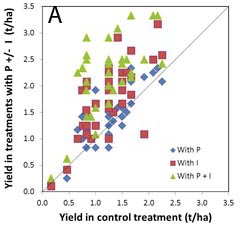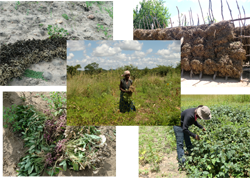N2Africa Podcaster 7
June/July 2011
|
| Title |
Summary |
Newsletter item # |
| Introduction |
This issue of the Podcaster reports on results from the research work stream. We have some interesting findings showing really stunning responses to inoculation and phosphorus in some countries with soyabean, although such responses are not found everywhere. The baseline studies are now available from most countries and are providing some interesting insights into gender and legume use. We include reports from MSc students who have conducted their research thesis work within the N2Africa project. We hope you will enjoy reading some of these interesting reports - and look forward to receiving your contributions for forthcoming issues!
|
1 |
| Research, dissemination and monitoring and evaluation teams to work together to understand applicability of N2Africa technologies in heterogeneous conditions of smallholder farmers |
 |
Agronomic trials conducted for two seasons in East and Central Africa and for one season in West and Southern Africa are yielding interesting results. This figure shows the enormous variations in Mushoma (DRC) soybean yields in the control treatments between different farmers.
|
|
2 |
| Gender research in N2Africa - going beyond target numbers for reaching women |
The N2Africa acknowledges the importance of women in agricultural production, household food security and income. The project recognizes that in aiming to ensure long-term sustainable impact it is of crucial importance to address explicitly the needs of women farmers, processors and marketers and to develop specific strategies for meaningful inclusion of women in project activities to ensure women benefit from the project. The project team has therefore embraced the target of at least 50% women involvement in all farmer-related activities of the project, as formulated in the project proposal. Moreover, the NGO WOCAN has recently provided a report on improving the gender responsiveness in the N2Africa project.
|
3 |
| Detailed farm characterisations to explore the adoption potential of grain legumes in Malawi |
In this MSc research by Greta van den Brand, legume technology niches were identified through detailed system characterization, with the use of a farm typology to deal with the large diversity in smallholder farms. The results of farm characterizations, covering diverse farm types in Mchinji and Salima district in central Malawi, were used to gain insights in the possibilities of legumes to improve nutrition, livelihoods and soil fertility.
|
4 |
| Understanding the role of legumes and their significance in Biological Nitrogen Fixation (BNF) in smallholder farming systems of Zimbabwe |
|
Report from Brenda Tsungai Manenji who conducted her MSc research in Zimbabwe in 2 regions: Murehwa, an area with high agro-ecological potential, and Mudzi, an area with low agro-ecological potential.
|
 |
|
5 |
| Boletim Informativo SOJA - nr.3 |
The Soya team from TechnoServe sent us their latest newsletter in Portugese.
|
6 |
|
|
The Podcaster is published six times per year – we look forward to receiving news and contributions – particularly from partners. Please send in contributions well in time. Contact address for this newsletter is: N2Africa.office@wur.nl
Please feel free to forward this email to colleagues you believe would be interested. This email has been sent to you by N2Africa, funded by The Bill & Melinda Gates Foundation.
When you change your e-mail address and want to keep receiving the Podcaster, please send your new address to N2Africa.office@wur.nl. If friends/colleagues like to receive future Podcasters let N2Africa.office@wur.nl know as well.



